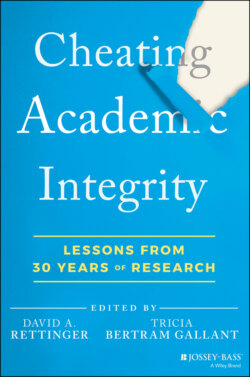Читать книгу Cheating Academic Integrity - Группа авторов - Страница 7
CHAPTER 1 Cheating Academic Integrity: Lessons from 30 Years of Research
ОглавлениеTricia Bertram Gallant1 and David A. Rettinger2
1University of California, San Diego
2University of Mary Washington
To cheat means to “act dishonestly or unfairly in order to gain an advantage” (Oxford Languages). Most readers will bristle at the thought of being lied to or being treated unfairly. This bristle instinct seems to be biological. In 2003, Brosnan and de Waal published a study in Nature showing that capuchin monkeys are exquisitely sensitive to unfairness, including the famous video of one experimental subject throwing cucumbers at the experimenter after witnessing an unfairly generous reward of grapes to another monkey. So, while it seems clear that both humans and monkeys detest unfairness, cheating in school persists. How can this be the case?
Stephens (2019) argued that cheating persists because it is natural and normal; that is, the propensity to cheat (deceive or trick), despite our instinct to avoid unfairness, was developed as a method for survival. This evolutionary development is even exemplified in our contemporary colloquial language such as in the English phrase “cheating death”.
It is within this vein that this book is written. The authors in this book illustrate not only how students cheat academic integrity by their decisions, choices and behaviors but also how instructors and higher education institutions cheat academic integrity by their decisions, choices and behaviors. In other words, through this book, we will learn that cheating occurs because of them (the students) and because of us (the faculty and staff).
It is imperative that we, as educators, understand the complex relationship between forces that can serve either to cheat academic integrity or to promote and support it. While cheating may be normal and natural, it is still “unethical and evitable” (Stephens, 2019). It is unethical because left unaddressed, cheating creates tears in the fabric of higher education. Cheating undermines raison dêtre, which can be stated simply as facilitating, assessing, and certifying learning. Given the essential role that higher education plays in twenty‐first century economics, democracy, health and sustainability, we cannot afford to idly watch the fabric be torn or participate in the tearing ourselves. The good news is that there is no need to do so. The last 30 years of research has taught us that cheating is evitable; we can do things to mitigate and minimize it.
This book, along with its companion piece (a special issue of the Journal of College and Character, volume 23(1), published in February 2022), illuminates a positive way forward that is not only good for our students but also for our shared goals of growing and certifying knowledge as well as developing ethical citizens and professionals. Both this volume and the special issue were created to celebrate and learn from 30 years of research on academic integrity, a research agenda that can be largely credited to the initial research agenda of Donald McCabe and the formation of the International Center for Academic Integrity (ICAI) in 1992. Together, these two volumes provide researchers, instructors, staff, and administrators with a scholarly perspective on the causes and context of cheating as well as the internal and external factors that serve to either promote and support academic integrity or to cheat academic integrity.
